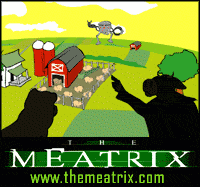
|
| Home | Reading Room | Newsletter | Reminders | Technique | Nursery |
| News | Sustainable Gardening | Trees & Shrubs | Flowers | Composting | Soil |
| Shopping | Tools | Books | How To's | Practical Advice | Children | IPM |
Home
Compost TeaCompost tea, that is. Being touted as the next big thing in gardening, compost tea is reported to increase disease resistance in plants, reduce fertilizer and water needs as well as plant stress, and improve soil structure, aeration, retention of nutrients, and cycling of nutrients into plant-available forms. Compost tea puts the microbes back into soils that have been subjected to chemicals or soils that are naturally limited in microbial activity. When applied to plant foliage, compost tea prevents harmful substances, including disease organisms, from reaching the plant. It also increases the amount of nutrients taken up by foliar-applied fertilizers.What is Compost Tea? Compost tea is an aerobically brewed liquid extract made from specially formulated compost mixtures. Properly made, it has beneficial organisms, including bacteria, protozoa, and nematodes, as well as nutrients that are essential for plant and soil health. It is not compost leachate, which results if you pour water through compost; nor is it compost extract, which is the liquid produced when water is added during the composting process. Both contain soluble nutrients but only a few organisms. How is Compost Tea Made? On the simplest level, making compost tea requires a container, a source of aeration, water, and compost (food for the microbes). Home gardener compost tea brewing systems, which usually make 5 gallons at a time, can be purchased for about $65 to $150. The compost/microbe food mixture generally costs about $6 for a 5-gallon batch. When purchasing a compost tea set-up, make sure to look for a brewer and compost/microbe food mixture that have been approved by a laboratory that tests for contaminants, chemical residues, and microorganisms. To make compost tea, tap water is aerated for several hours to remove the chlorine, then the compost mixture is added and the mixture aerates for approximately 12 to 24 hours, depending on the manufacturer. When finished, the tea must be used within four to six hours. How is Compost Tea Applied? Compost tea can be sprayed on leaves, branches, and trunks of plants; poured into the soil; or used as a root dip for bare-root plants, transplants, and cuttings. The frequency of application depends upon the use. For foliar application of actively growing plants, such as flowers or vegetables, compost tea can be sprayed on the foliage as frequently as weekly, especially if you're trying to combat diseases. When you first begin to improve your soil, it will benefit from applications of compost tea four to five times during the growing season. Once your soil is in good health, three yearly applications -- in spring, summer, and fall -- are usually adequate. To determine how much to use, follow the directions from the manufacturer of your brewing system. Compost tea does not contain human pathogens and is safe to use around children or pets. Do I Still Need to Use Compost or Fertilizer? Compost tea is like the fourth leg of a stool, the other legs being organic matter, additional nutrients, and mycorrhizae. Compost is still the first choice for adding organic matter to the soil. Kelp and fish emulsion, as well as other organic fertilizers, are your best choices for adding nutrients. Mycorrhizae inoculants are the other big news in gardening. They are a symbiotic fungal mixture that attaches to the plant roots and helps to feed and protect the plant. Adding one more thing to do in the garden may seem like one too many, but the reports on the success of using compost tea as part of a unified system of organic growing methods are difficult to ignore. The possibility of healthier, more productive plants is an irresistible siren call. Dr. Elaine Ingham, the soil biologist who has played one of the biggest roles in the evolution of compost tea, has published the fifth edition of The Compost Tea Brewing Manual (Soil Foodweb, 2005). This comprehensive manual on making, applying, and assessing compost tea includes up-to-date information on methods, research, and practical examples. The International Compost Tea Council Web site provides answers to the most frequently asked questions about making and using compost tea. You'll also find a selection of recommended reading on microbiology, natural gardening, soils, agriculture, and the environment.
|
| Reading Room | Trees and Shrubs | Flowers | Composting | Soil | Nursery |
| Shopping | Books | Tools | News | Internet Gardening | Links | Support |
| Vermicomposting | Pest Management | How To's | Practical Advice | Children |
| Home | Newsletter | About Us | Support | Contact |
|
GardenSimply.com | All Rights Reserved 2005 |
|
FREE
Garden Journal!! Join "Garden Notes" and plan for Harvest
Success as you track and record your gardening progress. Your Free Personal
Garden Journal includes printable pages making it easy for you to:
|
|
|
|
|
|
|
|
|
|

|
|
|
|



